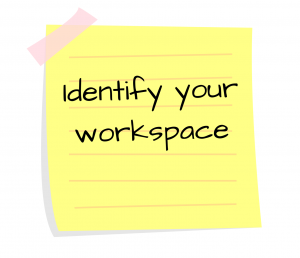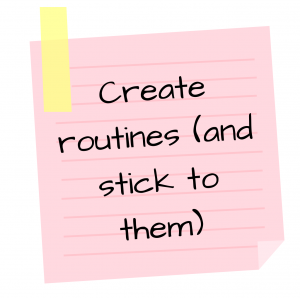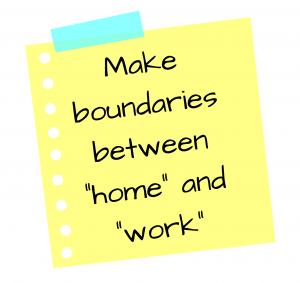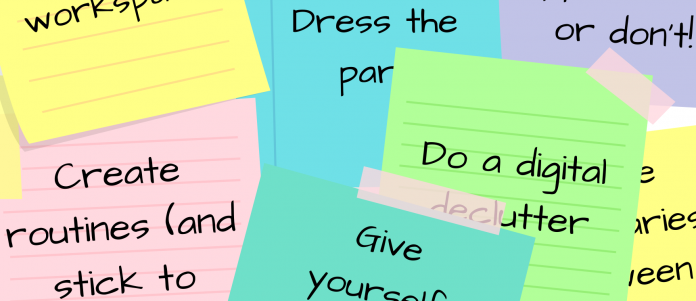With thousands of college students displaced from campus, many universities have shifted to online learning, with students working remotely to get their hard-earned credit hours. But for many students this is new territory. For students used to the semi-structured environment of college with scheduled classes and extracurriculars, working from home presents unique challenges. Fortunately, there are some concrete things you can do to boost your productivity while remaining socially distant. It all comes down to two basic categories: shaping your environment and scheduling your time.

Everyone’s living situation is different and presents unique challenges. Whether you have loud siblings, a tiny workspace, or a house packed full of distractions, you’ll have to adapt your surroundings to how you work best.

For a lot of college students, home is a liminal space. Your bedroom might be totally empty or packed full of your parents’ stuff. Some of your furniture might be back in your dorm, or your siblings may have taken over. Given these complications, it might be difficult to find a place to study but try your best!
Do you usually work in your dorm room? Then a desk in your bedroom might be perfect. If you like a more open environment, try the kitchen counter. If isolation is your thing, see if you have an extra closet (yes, really) that you can convert into a tiny office. Try working in a bunch of different locations around your home and see what works best for you. Don’t limit yourself to the conventional: if you really like typing away in a hammock or lying down on your living room floor, go for it!
With family and siblings potentially also staying at home and completing their own work and school, be sure to have a conversation about where everyone can set up and make that space their own. If there is no way to isolate, provide your family with your schedule and create agreed upon “work hours” where other members must let you be as you complete your schoolwork.

Think about where you study on campus. Is it the third floor of Earl Gregg Swem Library where dropping your pencil is considered a mortal sin? How about the hustle and bustle of Aromas Daily Grind? Wherever you like to work, you can try to recreate the soundscape at home.
For silence seekers, consider investing in some noise cancelling headphones, or playing white noise through your earbuds. For those who work best in a coffee shop environment, play some coffee shop noises (my personal recommendation: coffitivity.com) and hunker down with some tea. It’s not as good as an Aromas latte, but it’ll have to do.

If you’re used to taking notes by hand during a lecture, switching to online classes is a bit of a change. It’s easy to get distracted on your laptop, watching your professor fumble their way through a Zoom lecture. Fortunately, there are a few things you can do to limit distractions.
On most browsers, you have an option to hide your bookmarks. That might stop you from mindlessly clicking on Facebook instead of taking notes. Also, consider working in a different browser or an “incognito” tab, where you’ll have to manually sign into all of your accounts. That small amount of effort might be all it takes to stop you from distracting yourself. If you’re a hardcore procrastinator, there are programs out there (freedom is a good example) that block certain sites so you’re forced to focus on work.
Distractions are normal, and many platforms are specifically engineered to grab your attention. Take your power back, stay focused and persevere.

I know, I know, a lot of the appeal of remote work comes from wearing sweatpants all day, but often, clothes shape how you feel and think. By wearing pajama pants all day, you’re blurring the lines between relaxation time and work, leading to hours of binge-watching Netflix rather than writing an essay. Try wearing “real” clothes (really just changing out of your pajamas) when you’re doing schoolwork. Oftentimes, that’s enough to kick your brain into productivity mode.
The College of William and Mary’s students tend to have calendars full of classes, meetings, jobs, and extracurriculars. So, when you’re off campus and faced with huge chunks of time, it might be difficult to get anything done. Fortunately, you can still make your day productive by creatively scheduling your time at home.

It’s tempting to sleep in until noon every day, or to stay up until 4 a.m. playing videogames. I’m not here to tell you when to get work done (some people work best in the morning; others are ultra-productive at night), but you need an established routine to be productive.
At the very least wake up and go to bed at around the same time every day; whatever is normal for you. If you typically make yourself breakfast or sip on a coffee, do that every day. It’s all about establishing patterns. Once you have a routine going, it’s easy to kick yourself into work mode when it’s time to get stuff done.

One of the trickiest parts of working from home is the blurred line between your home life and your school life. That’s why it’s important to schedule time specifically for schoolwork, so you can actually get stuff done.
Try to treat school as a job: give yourself set hours where you have to work. Those hours will vary person to person, depending on how you work best. You might be an early riser, so you can schedule a block of time over your morning coffee. Or if you work best in the afternoon, try to work immediately after lunch. You know yourself best.
Adopting a looser schedule might be tempting, but soon you’ll find yourself baking cookies or watching TV during your peak studying time. The worst part is, you won’t fully enjoy your leisure activities, because in the back of your mind, you know you should be doing work. Scheduling your schoolwork gets rid of those nagging anxieties by clearly defining when to work and when you can goof off.

Even with difficult classwork, many students are faced with lots of extra time that would normally be devoted to on-campus activities. What you do with that time is up to you.
If you’re academically minded, use your extra hours in the day to deepen your knowledge. Read that nonfiction book on biology you’ve been meaning to get to or watch some informational videos on YouTube. So much of the world’s knowledge is online, it’s staggering how much you can learn.
But above all, don’t feel pressure to be productive all the time. We’re living in odd times, and everyone needs to destress. Pick up an old hobby or find a new one. Read for pleasure, catch up on TV shows, go down a Wikipedia rabbit hole. Use your extra time wisely, but don’t let it stop you from having fun.


